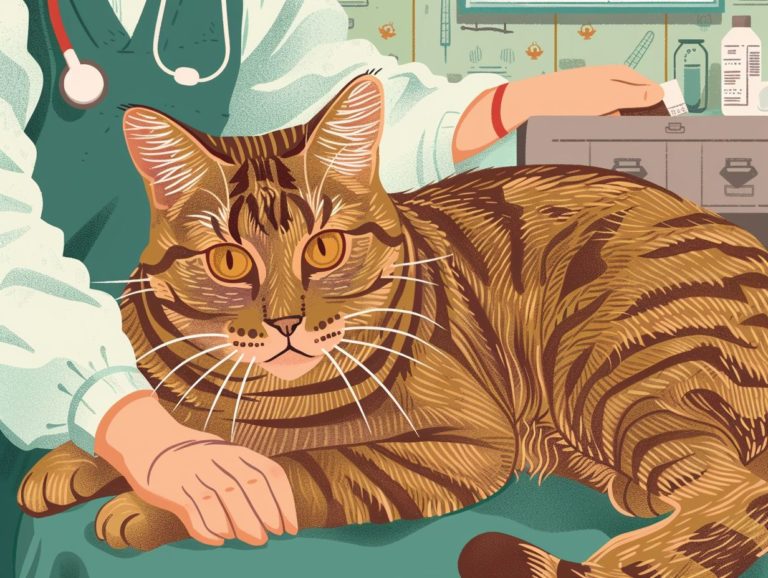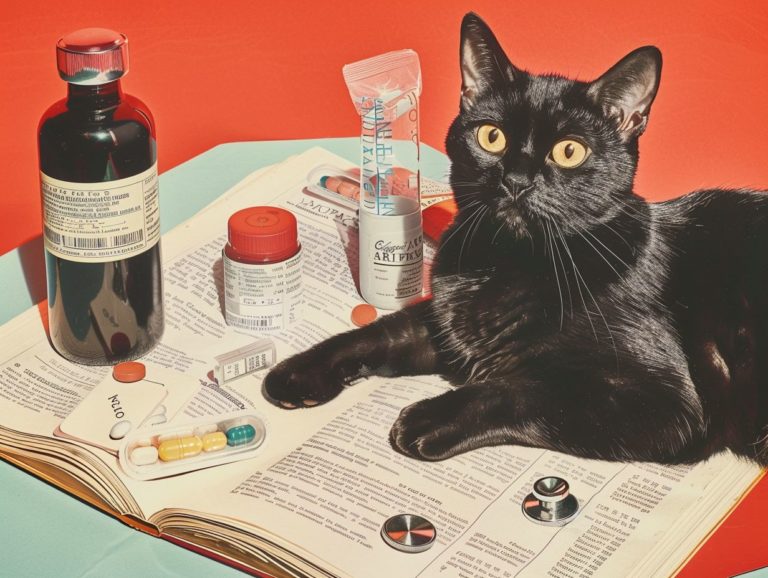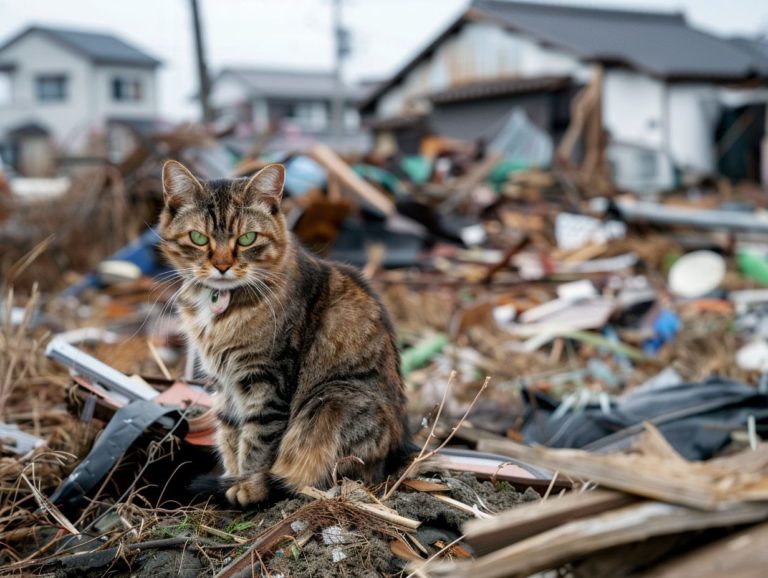Vaccination And Routine Checkups Covered By Your Cats Health Plan
Taking care of your cat’s health involves more than just providing food and shelter. This includes discussing the essential components of your cat’s health plan, such as vaccinations, routine check-ups, and maximizing the effectiveness of preventive measures. Understanding what is included in your cat’s health plan, the significance of vaccinations, the recommended frequency of check-ups, and the details of a routine visit are all crucial aspects in ensuring a long and healthy life for your domestic cat.
Key Takeaways:
Understanding Your Cat’s Health Plan
Understanding Your Cat’s Health Plan is one of the most important aspects of cat ownership to help ensure the well-being and longevity of your cat. It includes knowledge about pet insurance policies, wellness plans, and regular preventive veterinary care.
Pet insurance for cats provides financial protection in case of unexpected illness or injury, which can give great peace of mind to many owners. Wellness plans for cats, on the other hand, cover preventive services such as vaccinations, routine check-ups, and dental cleanings that are critical for continuous maintenance of your cat’s overall health.
Regular preventive veterinary care, including routine check-ups, vaccinations, dental checks, and annualizing treatments, help detect health issues early on, establish a strong relationship between you, your cat, and the veterinary provider, and help you stay on top of your cat’s health and well-being. This can help prevent more expensive treatments down the road and ensure a happy and healthy life for your beloved cat.
What is Covered and What is Not
The most crucial aspect of exploring pet insurance is understanding what is covered and what is not in a pet insurance policy. Coverage options typically include accidents, illnesses, and add-on wellness packages. Accident coverage usually encompasses sudden unforeseen events such as broken bones or ingestion of foreign objects. Illness coverage can extend to a wide range of conditions from allergies to chronic diseases. Many pet insurance policies offer add-ons for routine wellness care, which may include annual check-ups, vaccinations, and preventive treatments. Some policies allow reimbursement of up to 90% of eligible expenses, easing the financial burden when your pet requires veterinary care. Curable conditions like infections or certain cancers are typically covered, while pre-existing conditions or elective procedures may be excluded from coverage.
The Importance of Vaccinations for Cats
Understanding the importance of vaccinations for cats is crucial for ensuring proper preventive care and overall good health for cats. Vaccinations play a vital role in protecting pets from various dangerous diseases, making regular vaccinations essential for preventing common yet serious illnesses. Recommended vaccines for cats, such as rabies, feline viral rhinotracheitis, calicivirus, and panleukopenia (FVRCP), provide additional antibodies that enhance protection against infections and diseases. Incorporating regular vaccination into a comprehensive pet wellness plan can significantly decrease the likelihood of a cat contracting life-threatening illnesses, thereby enhancing their quality of life and ensuring their long-term health and happiness.
Common Vaccines for Cats
The most common vaccines for cats are those that protect against feline calicivirus, feline herpesvirus, and feline leukemia. These vaccines are essential components of preventive care and contribute to the overall health of your cat. Vaccinations play a crucial role in safeguarding cats against potentially life-threatening diseases.
For instance, the feline calicivirus vaccine guards against respiratory illness, the feline herpesvirus vaccine offers protection against upper respiratory disease, and the feline leukemia vaccine helps prevent the transmission of this contagious and often fatal disease among cats.
By incorporating these vaccines into your pet’s preventive care regimen, you are taking a proactive step to enhance their long-term well-being and shield them from the risks of serious illnesses.
Benefits of Vaccinating Your Cat
Vaccinating a cat offers benefits such as protection against fatal or severe illnesses and contributes to the overall health and well-being of the pet. Routine vaccination, preventive care, and supportive care are essential aspects of responsible pet ownership.
Keeping a cat’s vaccinations up to date is a key factor in saving money for the owner in the long term. Regular preventive care, including weekly, monthly, and yearly check-ups, helps avoid costly treatments for diseases that could have been prevented by vaccines.
Vaccines not only safeguard the cat but also help create a healthy environment for other pets and family members. Comprehensive preventive care plans, including vaccination schedules, promote the cat’s health and provide the owner with peace of mind, knowing they are taking all necessary steps to ensure their pet enjoys a long and healthy life.
The Role of Routine Check-Ups in Your Cat’s Health
Regular check-ups are essential for maintaining the health of cats. Visiting the veterinarian regularly is crucial for preventive care and early detection of health issues. These routine check-ups allow veterinarians to assess your cat’s overall health, address any concerns, and administer necessary vaccinations. By scheduling regular visits to the vet, you can help prevent future diseases that may require costly treatments if left undetected.
Additionally, routine check-ups help build a relationship between your cat and the veterinarian, ultimately reducing stress during future veterinary visits for your furry companion.
Recommended Frequency and Procedures
The recommended frequency of routine check-ups for cats is once or twice a year, depending on their age and health status. These check-ups involve a full examination and diagnostic tests to ensure the overall well-being of cats and detect any potential health problems early.
Vital signs, weight, teeth, and ears are checked during these appointments to assess the cat’s health. Additionally, vaccinations and deworming are commonly administered during the initial visits within the first year.
Regular check-ups are essential for preventive care, aiding in maintaining good health and prolonging the life of pets. They also facilitate the development of personalized pet wellness plans tailored to meet the specific needs of each cat.
What to Expect During a Routine Check-Up
During a routine check-up for a cat, one can expect a veterinary physical examination, which should include vital sign assessment, a thorough systemic examination for any abnormalities, and diagnostic tests if indicated. The following is included in a routine check-up for a cat: an examination of the eyes, ears, mouth, and skin, which can reveal many infections and diseases. The veterinarian will listen to your cat’s heart and lungs to ensure that no cardiovascular issues are present. Preventative procedures such as vaccinations are often performed during a routine check-up to protect the cat from common diseases. At the very least, one can expect the veterinarian to discuss dental health and recommend regular teeth cleanings. Regular assessments track a cat’s general well-being and catch any potential problems early. Normal evaluations establish a cat’s health baseline, which could help recognize abnormalities in the future. Regular vet visits and preventative treatment are essential for ensuring that a cat remains healthy and lives a long and comfortable life.
Physical Exam and Diagnostic Tests
During a routine check-up for cats, a physical exam typically includes assessing body condition score, auscultating the heart and lungs, examining the eyes and ears, and palpating the abdomen. Diagnostic tests such as blood work, urinalysis, and additional screenings based on the physical examination findings and medical history are crucial in evaluating a cat’s overall health.
Veterinarians often address dental care with owners during these routine exams, as dental issues can significantly impact a cat’s health. Another important topic discussed by veterinarians is microchipping, ensuring the identification and safe return of cats if they ever become lost.
Regular assessments during routine check-ups are essential for early detection, prevention, and timely management of potential health issues, ultimately helping to prevent costly emergency situations.
Maximizing Your Cat’s Health Plan Benefits
To maximize the benefits of a cat’s health plan, owners should ensure that preventive care measures, such as vaccinations and regular check-ups, are fully utilized. Keeping their cat up to date on vaccinations and scheduling regular vet visits enables early detection of potential health issues and helps prevent costly treatments in the future.
Wellness plans play a crucial role in managing costs related to preventive care by covering annual exams, screenings, and dental cleanings. Therefore, pet insurance plans that provide reimbursement for preventive care should be considered to help with expenses. Owners should also be mindful of pre-existing conditions and how they could affect coverage eligibility and reimbursement procedures.
Tips for Utilizing Vaccinations and Check-Ups Effectively
Ensuring the optimal health of your cat involves following vaccination schedules, maintaining medical records, and promptly discussing any health concerns with your veterinarian. These preventive measures are essential for your cat’s overall well-being.
Regular veterinary check-ups are crucial for early detection of any signs of disease or underlying medical conditions in your cat. By sticking to a consistent schedule, you can minimize the risk of your cat contracting preventable diseases and illnesses.
In case of accidents or sudden changes in behavior, it is important to contact your veterinarian without delay. Additional aspects to include in a wellness plan are dental care and prevention of parasites, which contribute to enhancing your cat’s overall health and quality of life.
Frequently Asked Questions
Are vaccinations and routine check-ups covered by my cat s health plan?
Yes, most cat health plans cover vaccinations and routine check-ups. However, it is important to check with your specific plan to confirm coverage.
What vaccinations are typically covered by a cat s health plan?
Common vaccinations that are covered by cat health plans include rabies, Feline Distemper, and Feline Leukemia. Some plans may also cover additional vaccinations depending on your cat s lifestyle and risk factors.
Do I still need to pay for vaccinations and check-ups if my cat has a health plan?
It depends on the type of plan you have. Some plans cover the full cost of vaccinations and check-ups, while others may require a copay or deductible. Make sure to review your plan s coverage details.
Can I choose any veterinarian for my cat s routine check-ups?
It depends on the type of cat health plan you have. Some plans have a network of preferred providers that you must use in order to receive coverage. Others may allow you to choose any licensed veterinarian.
Are routine check-ups only for when my cat is sick?
No, routine check-ups are important for maintaining your cat s overall health and preventing future health issues. They typically include a physical exam, vaccinations, and preventive care measures.
What happens if my cat needs additional medical care during a routine check-up?
If your cat requires additional medical care during a routine check-up, it may or may not be covered by your health plan. It is important to review your plan s coverage details and discuss any potential costs with your veterinarian beforehand.




